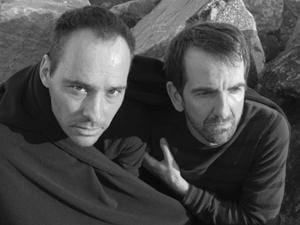When it was first produced in 1994, Geoff Kavanagh’s Ditch was a huge success. The darkly comedic play about two sailors stranded in Canada’s Arctic in 1845 garnered a Chalmers Award, critical praise and sold-out houses. Yet the work never saw a subsequent Canadian production, a perplexing oversight, since theatre decision-makers are typically willing to hedge their bets on works that have a proven track record of success.
Actor/producer Robert Tsonos thinks he knows why.
“It’s the gay subject matter,” he says. “There’s a lot of strong language depicting graphic discussions of sex between men,” he says. “If it was a play about a straight couple this good, it would have toured across the country. The content scares people off.”
Hennesy (Tsonos) and Whitbread (Clinton Walker) sit together in a ditch, the former with a broken foot, the latter with tuberculosis and lead poisoning. Part of a crew whose ship became lodged in ice, they became a burden to their compatriots and were left to die.
Both are gay, and in their final days they contemplate what their relationship was and could have been. The plot doesn’t exactly involve a rollicking good time, but Tsonos stresses the story is more than doom and gloom.
“It’s actually a beautiful love story,” he says. “They are dying, starving and slowly going mad, but that brings about some poignant realizations about life. It’s also very funny in some parts, in that gallows humour kind of way.”
Although Tsonos’s company, Sometimes Y Theatre, has been producing a steady stream of work since 1997, Ditch will mark its first production in Toronto since 2003’s William and James, a similarly tragic tale of a gay romance in Victorian England. However, the group’s been busy with work in the UK, East Asia and Australia, largely because Tsonos spent much of the last decade in Tokyo after his partner was transferred there for work.
Tsonos was pleasantly surprised when he was booked for a national TV commercial his first week there.
“That was actually a huge help in getting things going, beyond my career,” he says. “Japan has no recognition of same-sex couples, so I couldn’t get a visa through my partner. But after I booked the commercial they got me a work permit, and things developed from there.”
His career soon exploded in Japan, and he continued to be booked for commercials, voiceovers for video games and animated films, as well as a handful of film and TV roles. He was also contracted to direct a series of plays at the Canadian embassy in Tokyo.
“I was actually busier in Japan than I was in Toronto,” he laughs. “It was a pleasant surprise but also very rewarding in terms of the breadth of stuff I was able to do. Working for the embassy was really high profile and helped with those other international opportunities.”
Japan may not officially recognize same-sex relationships, but Tsonos says there’s no shortage of gay action. Tokyo’s Shinjuku district boasts more than 200 gay bars, though most are very tiny, hold just 10 to 15 people, and cater to an exclusive clientele.
“Gay culture was quite underground, but also quite large,” he says. “In terms of sexuality, the culture doesn’t have many qualms. But getting married and having children is still the expected norm. From what I understand, it was less of an issue in the past. But then Westerners showed up with Christianity and wagged their fingers at it, forcing it into the shadows.”
The Deets:
Ditch
Nov 2-20 at 8pm
(Sat & Sun, 2pm)
Theatre Passe Muraille Backspace
16 Ryerson Ave
artsboxoffice.ca


 Why you can trust Xtra
Why you can trust Xtra


